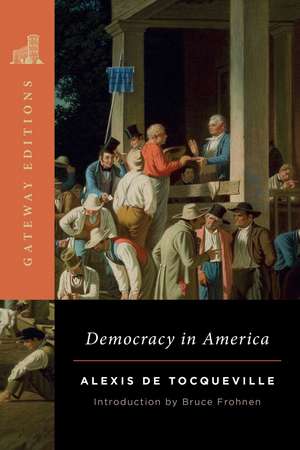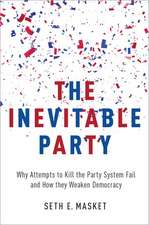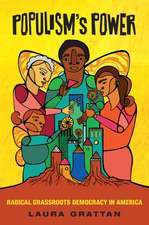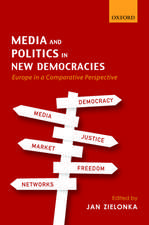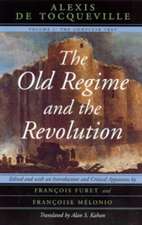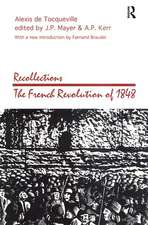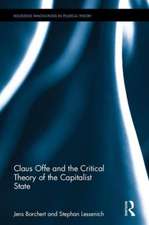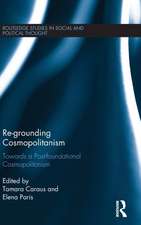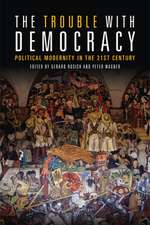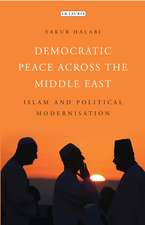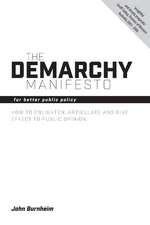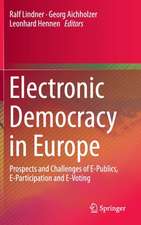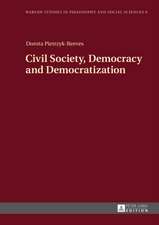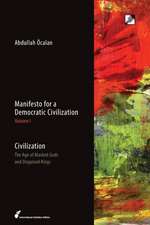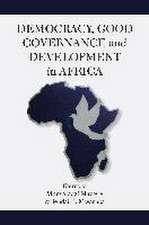Democracy in America
Autor Alexis de Tocqueville Editat de Bruce Frohnenen Limba Engleză Paperback – 12 sep 2024
The enduring appeal of Democracy in America lies in the eloquent, prophetic voice of Alexis de Tocqueville (1805–1859), a French aristocrat who visited the United States in 1831. A thoughtful young man in a still-young country, he succeeded in penning this penetrating study of America’s people, culture, history, geography, politics, legal system, and economy.
Tocqueville asserts, “I confess that in America I saw more than America; I sought the image of democracy itself, with its inclinations, its character, its prejudices, and its passions, in order to learn what we have to fear or hope from its progress.”
As Bruce Frohnen notes in his introduction to this edition, this republication of Henry Reeve’s “important translation” beautifully showcases “one of the world’s greatest achievements in political philosophy.”
| Toate formatele și edițiile | Preț | Express |
|---|---|---|
| Paperback (5) | 41.85 lei 3-4 săpt. | +21.17 lei 10-14 zile |
| Bantam Classics – 31 mai 2004 | 41.85 lei 3-4 săpt. | +21.17 lei 10-14 zile |
| SKYHORSE PUBLISHING – 12 sep 2024 | 105.57 lei 27-39 zile | |
| HarperCollins Publishers – 11 iun 2007 | 105.77 lei 3-5 săpt. | |
| HarperCollins Publishers – 28 aug 2006 | 146.36 lei 3-5 săpt. | |
| University of Chicago Press – apr 2002 | 170.96 lei 3-5 săpt. | +43.69 lei 10-14 zile |
| Hardback (1) | 113.66 lei 26-32 zile | +50.30 lei 10-14 zile |
| EVERYMAN – 20 apr 1994 | 113.66 lei 26-32 zile | +50.30 lei 10-14 zile |
Preț: 105.57 lei
Preț vechi: 125.73 lei
-16% Nou
Puncte Express: 158
Preț estimativ în valută:
20.20€ • 20.97$ • 16.85£
20.20€ • 20.97$ • 16.85£
Carte disponibilă
Livrare economică 07-19 martie
Preluare comenzi: 021 569.72.76
Specificații
ISBN-13: 9781684515387
ISBN-10: 1684515386
Pagini: 792
Dimensiuni: 152 x 229 x 48 mm
Greutate: 0.86 kg
Editura: SKYHORSE PUBLISHING
Colecția Gateway Editions
ISBN-10: 1684515386
Pagini: 792
Dimensiuni: 152 x 229 x 48 mm
Greutate: 0.86 kg
Editura: SKYHORSE PUBLISHING
Colecția Gateway Editions
Notă biografică
Alexis Charles Henri Clérel, Comte de Tocqueville (1805-1859) was a French diplomat and historian best known for the account of his trip to the United States in 1831, Democracy in America.
Extras
CHAPTER III: SOCIAL CONDITION OF THE ANGLO-AMERICANS
A social condition is commonly the result of circumstances, sometimes of laws, oftener still of these two causes united; but wherever it exists, it may justly be considered as the source of almost all the laws, the usages, and the ideas which regulate the conduct of nations; whatever it does not produce it modifies. It is therefore necessary, if we would become acquainted with the legislation and the manners of a nation, to begin by the study of its social condition.
THE STRIKING CHARACTERISTIC OF THE SOCIAL CONDITION OF THE ANGLO-AMERICANS IN ITS ESSENTIAL DEMOCRACY
The first emigrants of New England--Their equality--Aristocratic laws introduced in the South--Period of the Revolution--Change in the law of descent--Effects produced by this change--Democracy carried to its utmost limits in the new States of the West--Equality of education.
Many important observations suggest themselves upon the social condition of the Anglo-Americans, but there is one which takes precedence of all the rest. The social condition of the Americans is eminently democratic; this was its character at the foundation of the Colonies, and is still more strongly marked at the present day. I have stated in the preceding chapter that great equality existed among the emigrants who settled on the shores of New England. The germ of aristocracy was never planted in that part of the Union. The only influence which obtained there was that of intellect; the people were used to reverence certain names as the emblems of knowledge and virtue. Some of their fellow-citizens acquired a power over the rest which might truly have been called aristocratic, if it had been capable of transmission from father to son.
This was the state of things to the east of the Hudson: to the south-west of that river, and in the direction of the Floridas, the case was different. In most of the States situated to the south-west of the Hudson some great English proprietors had settled, who had imported with them aristocratic principles and the English law of descent. I have explained the reasons why it was impossible ever to establish a powerful aristocracy in America; these reasons existed with less force to the southwest of the Hudson. In the South, one man, aided by slaves, could cultivate a great extent of country: it was therefore common to see rich landed proprietors. But their influence was not altogether aristocratic as that term is understood in Europe, since they possessed no privileges; and the cultivation of their estates being carried on by slaves, they had no tenants depending on them, and consequently no patronage. Still, the great proprietors south of the Hudson constituted a superior class, having ideas and tastes of its own, and forming the centre of political action. This kind of aristocracy sympathized with the body of the people, whose passions and interests it easily embraced; but it was too weak and too short-lived to excite either love or hatred for itself. This was the class which headed the insurrection in the South, and furnished the best leaders of the American revolution.
At the period of which we are now speaking society was shaken to its centre: the people, in whose name the struggle had taken place, conceived the desire of exercising the authority which it had acquired; its democratic tendencies were awakened; and having thrown off the yoke of the mother country, it aspired to independence of every kind. The influence of individuals gradually ceased to be felt, and custom and law united together to produce the same result.
But the law of descent was the last step of equality. I am surprised that ancient and modern jurists have not attributed to this law a greater influence on human affairs.a It is true that these laws belong to civil affairs; but they ought nevertheless to be placed at the head of all political institutions; for, whilst political laws are only the symbol of a nation's condition, they exercise an incredible influence upon its social state. They have, moreover, a sure and uniform manner of operating upon society, affecting, as it were, generations yet unborn.
Through their means man acquires a kind of preternatural power over the future lot of his fellow-creatures. When the legislator has regulated the law of inheritance, he may rest from his labor. The machine once put in motion will go on for ages, and advance, as if self-guided, towards a given point. When framed in a particular manner, this law unites, draws together, and vests property and power in a few hands: its tendency is clearly aristocratic. On opposite principles its action is still more rapid; it divides, distributes, and disperses both property and power. Alarmed by the rapidity of its progress, those who despair of arresting its motion endeavor to obstruct it by difficulties and impediments; they vainly seek to counteract its effect by contrary efforts; but it gradually reduces or destroys every obstacle, until by its incessant activity the bulwarks of the influence of wealth are ground down to the fine and shifting sand which is the basis of democracy. When the law of inheritance permits, still more when it decrees, the equal division of a father's property amongst all his children, its effects are of two kinds: it is important to distinguish them from each other, although they tend to the same end.
In virtue of the law of partible inheritance, the death of every proprietor brings about a kind of revolution in progeny; not only do his possessions change hands, but their very nature is altered, since they are parcelled into shares, which become smaller and smaller at each division. This is the direct and, as it were, the physical effect of the law. It follows, then, that in countries where equality of inheritance is established by law, property, and especially landed property, must have a tendency to perpetual diminution. The effects, however, of such legislation would only be perceptible after lapse of time, if the law was abandoned to its own working; for supposing the family to consist of two children (and in a country peopled as France is the average number is not above three), these children, sharing amongst them the fortune of both parents, would not be poorer than their father or mother.
But the law of equal division exercises its influence not merely upon the property itself, but it affects the minds of the heirs, and brings their passions into play. These indirect consequences tend powerfully to the destruction of large fortunes, and especially of large domains. Among nations whose law of descent is founded upon the right of primogeniture landed estates often pass from generation to generation without undergoing division, the consequence of which that family feeling is to a certain degree incorporated with the estate. The family represents the estate, the estate family; whose name, together with its origin, its glory, power, and its virtues, is thus perpetuated in an imperishable memorial of the past and a sure pledge of the future.
When the equal partition of property is established by law, the intimate connection is destroyed between family feeling and the preservation of the paternal estate; the property ceases to represent the family; for as it must inevitably be divided after one or two generations, it has evidently a constant tendency to diminish, and must in the end be completely dispersed. The sons of the great landed proprietor, if they are few in number, or if fortune befriends them, may indeed entertain the hope of being as wealthy as their father, but not that of possessing the same property as he did; the riches must necessarily be composed of elements different from his.
Now, from the moment that you divest the landowner of that interest in the preservation of his estate which he derives from association, from tradition, and from family pride, you may be certain that sooner or later he will dispose of it; for there is a strong pecuniary interest in favor of selling, as floating capital produces higher interest than real property, and is more readily available to gratify the passions of the moment.
Great landed estates which have once been divided never come together again; for the small proprietor draws from his land a better revenue, in proportion, than the large owner does from his, and of course he sells it at a higher rate.b The calculations of gain, therefore, which decide the rich man to sell his domain will still more powerfully influence him against buying small estates to unite them into a large one.
What is called family pride is often founded upon an illusion of self-love. A man wishes to perpetuate and immortalize himself, as it were, in his great-grandchildren. Where the esprit de famille ceases to act individual selfishness comes into play. When the idea of family becomes vague, indeterminate, and uncertain, a man thinks of his present convenience; he provides for the establishment of his succeeding generation, and no more. Either a man gives up the idea of perpetuating his family, or at any rate he seeks to accomplish it by other means than that of a landed estate. Thus not only does the 1aw of partible inheritance render it difficult for families to preserve their ancestral domains entire, but it deprives them of the inclination to attempt it, and compels them in some measure to co-operate with the law in their own extinction.
The law of equal distribution proceeds by two methods: by acting upon things, it acts upon persons; by influencing persons, it affects things. By these means the law succeeds in striking at the root of landed property, and dispersing rapidly both families and fortunes.c
Most certainly it is not for us Frenchmen of the nineteenth century, who daily witness the political and social changes which the law of partition is bringing to pass, to question its influence. It is perpetually conspicuous in our country, overthrowing the walls of our dwellings and removing the landmarks of our fields. But although it has produced great effects in France, much still remains for it to do. Our recollections, opinions, and habits present powerful obstacles to its progress.
In the United States it has nearly completed its work of destruction, and there we can best study its results. The English laws concerning the transmission of property were abolished in almost all the States at the time of the Revolution. The law of entail was so modified as not to interrupt the free circulation of property.d The first generation having passed away, estates began to be parcelled out, and the change became more and more rapid with the progress of time. At this moment, after a lapse of a little more than sixty years, the aspect of society is totally altered; the families of the great landed proprietors are almost all commingled with the general mass. In the State of New York, which formerly contained many of these, there are but two who still keep their heads above the stream, and they must shortly disappear. The sons of these opulent citizens are become merchants, lawyers, or physicians. Most of them have lapsed into obscurity. The last trace of hereditary ranks and distinction is destroyed--the law of partition has reduced all to one level.
I do not mean that there is any deficiency of wealthy individuals in the United States; I know of no country, indeed, where the love of money has taken stronger hold on the affections of men, and where the profounder contempt is expressed for the theory of the permanent equality of property. But wealth circulates with inconceivable rapidity, and experience shows that it is rare to find two succeeding generations in the full enjoyment of it.
This picture, which may perhaps be thought to be overcharged, still gives a very imperfect idea of what is taking place in the new States of the West and South-west. At the end of the last century a few bold adventurers began to penetrate into the valleys of the Mississippi, and the mass of the population very soon began to move in that direction: communities unheard of till then were seen to emerge from the wilds: States whose names were not in existence a few years before claimed their place in the American Union; and in the Western settlements we may behold democracy arrived at its most extreme. In these States, founded off-hand, and, as it were, by chance, the inhabitants are but of yesterday. Scarcely known to one another, the nearest neighbors are ignorant of each other's history. In this part of the American continent, therefore, the population has not experienced the influence of great names and great wealth, nor even that of the natural aristocracy of knowledge and virtue. None are there to wield that respectable power which men willingly grant to the remembrance of a life spent in doing good before their eyes. The new States of the West are already inhabited but society has no existence among them.e
It is not only the fortunes of men which are equal in America; even their requirements partake in some degree of the same uniformity. I do not believe that there is a country in the World where, in proportion to the population, there are so few uninstructed and at the same time so few learned individuals. Primary instruction is within the reach of everybody; superior instruction is scarcely to be obtained by any. This is not surprising; it is in fact the necessary consequence of what we have advanced above. Almost all the Americans are in easy circumstances, and can therefore obtain the first elements of human knowledge.
In America there are comparatively few who are rich enough to live without a profession. Every profession requires an apprenticeship, which limits the time of instruction to the early years of life. At fifteen they enter upon the calling, and thus their education ends at the age when ours begins. Whatever is done afterwards is with a view to some special and lucrative object; a science is taken up as a matter of business, and the only branch of it which is attended to is such as admits of an immediate practical application. In America most of the rich men were formerly poor; most of those who now enjoy leisure were absorbed in business during their youth; the consequence of which is, that when they might have had a taste for study they had no time for it, and when time is at their disposal they have no longer the inclination.
There is no class, then, in America, in which the taste for intellectual pleasures is transmitted with hereditary fortune and leisure, and by which the labors of the intellect are held in honor. Accordingly there is an equal want of the desire and the power of application to these objects.
A middle standard is fixed in America for human knowledge. All approach as near to it as they can; some as they rise, others as they descend. Of course, an immense multitude of persons are to be found who entertain the same number of ideas on religion, history, science, political economy, legislation, and government. The gifts of intellect proceed directly from God, and man cannot prevent their unequal distribution. But in consequence of the state of things which we have here represented it happens that, although the capacities of men are widely different, as the Creator has doubtless intended they should be, they are submitted to the same method of treatment.
In America the aristocratic element has always been feeble from its birth; and if at the present day it is not actually destroyed, it is at any rate so completely disabled that we can scarcely assign to it any degree of influence in the course of affairs. The democratic principle, on the contrary, has gained so much strength by time, by events, and by legislation, as to have become not only predominant but all-powerful. There is no family or corporate authority, and it is rare to find even the influence of individual character enjoy any durability.
America, then, exhibits in her social state a most extraordinary phenomenon. Men are there seen on a greater equality in point of fortune and intellect, or, in other words, more equal in their strength, than in any other country of the world, or in any age of which history has preserved the remembrance.
a I understand by the law of descent all those laws whose principal object is to regulate the distribution of property after the death of its owner. The law of entail is of this number; it certainly prevents the owner from disposing of his possessions before his death; but this is solely with the view of preserving them entire for the heir. The principal object, therefore, of the law of entail is to regulate the descent of property after the death of its owner: its other provisions are merely means to this end.
b I do not mean to say that the small proprietor cultivates his land better, but he cultivates it with more ardor and care; so that he makes up by his labor for his want of skill.
c Land being the most stable kind of property we find from time to time, rich individuals who are disposed to make great sacrifices in order to obtain it, and who willingly forfeit a considerable part of their income to make sure of the rest. But these are accidental cases. The preference for landed property is no longer found habitually in any class but among the poor. The small landowner, who has less information, less imagination, and fewer passions than the great one, is generally occupied with the desire of increasing his estate: and it often happens that by inheritance, by marriage, or by the chances of trade, he is gradually furnished with the means. Thus, to balance the tendency which leads men to divide their estates, there exists another, which incites them to add to them. This tendency, which is sufficient to prevent estates from being divided ad infinitum, is not strong enough to create great territorial possessions, certainly not to keep them up in the same family.
d See Appendix G.
e [This may have been true in 1832, but is not so in 1874, when great cities like Chicago and San Francisco have sprung up in the Western States. But as yet the Western States exert no powerful influence on American society.--Translator's Note.]
A social condition is commonly the result of circumstances, sometimes of laws, oftener still of these two causes united; but wherever it exists, it may justly be considered as the source of almost all the laws, the usages, and the ideas which regulate the conduct of nations; whatever it does not produce it modifies. It is therefore necessary, if we would become acquainted with the legislation and the manners of a nation, to begin by the study of its social condition.
THE STRIKING CHARACTERISTIC OF THE SOCIAL CONDITION OF THE ANGLO-AMERICANS IN ITS ESSENTIAL DEMOCRACY
The first emigrants of New England--Their equality--Aristocratic laws introduced in the South--Period of the Revolution--Change in the law of descent--Effects produced by this change--Democracy carried to its utmost limits in the new States of the West--Equality of education.
Many important observations suggest themselves upon the social condition of the Anglo-Americans, but there is one which takes precedence of all the rest. The social condition of the Americans is eminently democratic; this was its character at the foundation of the Colonies, and is still more strongly marked at the present day. I have stated in the preceding chapter that great equality existed among the emigrants who settled on the shores of New England. The germ of aristocracy was never planted in that part of the Union. The only influence which obtained there was that of intellect; the people were used to reverence certain names as the emblems of knowledge and virtue. Some of their fellow-citizens acquired a power over the rest which might truly have been called aristocratic, if it had been capable of transmission from father to son.
This was the state of things to the east of the Hudson: to the south-west of that river, and in the direction of the Floridas, the case was different. In most of the States situated to the south-west of the Hudson some great English proprietors had settled, who had imported with them aristocratic principles and the English law of descent. I have explained the reasons why it was impossible ever to establish a powerful aristocracy in America; these reasons existed with less force to the southwest of the Hudson. In the South, one man, aided by slaves, could cultivate a great extent of country: it was therefore common to see rich landed proprietors. But their influence was not altogether aristocratic as that term is understood in Europe, since they possessed no privileges; and the cultivation of their estates being carried on by slaves, they had no tenants depending on them, and consequently no patronage. Still, the great proprietors south of the Hudson constituted a superior class, having ideas and tastes of its own, and forming the centre of political action. This kind of aristocracy sympathized with the body of the people, whose passions and interests it easily embraced; but it was too weak and too short-lived to excite either love or hatred for itself. This was the class which headed the insurrection in the South, and furnished the best leaders of the American revolution.
At the period of which we are now speaking society was shaken to its centre: the people, in whose name the struggle had taken place, conceived the desire of exercising the authority which it had acquired; its democratic tendencies were awakened; and having thrown off the yoke of the mother country, it aspired to independence of every kind. The influence of individuals gradually ceased to be felt, and custom and law united together to produce the same result.
But the law of descent was the last step of equality. I am surprised that ancient and modern jurists have not attributed to this law a greater influence on human affairs.a It is true that these laws belong to civil affairs; but they ought nevertheless to be placed at the head of all political institutions; for, whilst political laws are only the symbol of a nation's condition, they exercise an incredible influence upon its social state. They have, moreover, a sure and uniform manner of operating upon society, affecting, as it were, generations yet unborn.
Through their means man acquires a kind of preternatural power over the future lot of his fellow-creatures. When the legislator has regulated the law of inheritance, he may rest from his labor. The machine once put in motion will go on for ages, and advance, as if self-guided, towards a given point. When framed in a particular manner, this law unites, draws together, and vests property and power in a few hands: its tendency is clearly aristocratic. On opposite principles its action is still more rapid; it divides, distributes, and disperses both property and power. Alarmed by the rapidity of its progress, those who despair of arresting its motion endeavor to obstruct it by difficulties and impediments; they vainly seek to counteract its effect by contrary efforts; but it gradually reduces or destroys every obstacle, until by its incessant activity the bulwarks of the influence of wealth are ground down to the fine and shifting sand which is the basis of democracy. When the law of inheritance permits, still more when it decrees, the equal division of a father's property amongst all his children, its effects are of two kinds: it is important to distinguish them from each other, although they tend to the same end.
In virtue of the law of partible inheritance, the death of every proprietor brings about a kind of revolution in progeny; not only do his possessions change hands, but their very nature is altered, since they are parcelled into shares, which become smaller and smaller at each division. This is the direct and, as it were, the physical effect of the law. It follows, then, that in countries where equality of inheritance is established by law, property, and especially landed property, must have a tendency to perpetual diminution. The effects, however, of such legislation would only be perceptible after lapse of time, if the law was abandoned to its own working; for supposing the family to consist of two children (and in a country peopled as France is the average number is not above three), these children, sharing amongst them the fortune of both parents, would not be poorer than their father or mother.
But the law of equal division exercises its influence not merely upon the property itself, but it affects the minds of the heirs, and brings their passions into play. These indirect consequences tend powerfully to the destruction of large fortunes, and especially of large domains. Among nations whose law of descent is founded upon the right of primogeniture landed estates often pass from generation to generation without undergoing division, the consequence of which that family feeling is to a certain degree incorporated with the estate. The family represents the estate, the estate family; whose name, together with its origin, its glory, power, and its virtues, is thus perpetuated in an imperishable memorial of the past and a sure pledge of the future.
When the equal partition of property is established by law, the intimate connection is destroyed between family feeling and the preservation of the paternal estate; the property ceases to represent the family; for as it must inevitably be divided after one or two generations, it has evidently a constant tendency to diminish, and must in the end be completely dispersed. The sons of the great landed proprietor, if they are few in number, or if fortune befriends them, may indeed entertain the hope of being as wealthy as their father, but not that of possessing the same property as he did; the riches must necessarily be composed of elements different from his.
Now, from the moment that you divest the landowner of that interest in the preservation of his estate which he derives from association, from tradition, and from family pride, you may be certain that sooner or later he will dispose of it; for there is a strong pecuniary interest in favor of selling, as floating capital produces higher interest than real property, and is more readily available to gratify the passions of the moment.
Great landed estates which have once been divided never come together again; for the small proprietor draws from his land a better revenue, in proportion, than the large owner does from his, and of course he sells it at a higher rate.b The calculations of gain, therefore, which decide the rich man to sell his domain will still more powerfully influence him against buying small estates to unite them into a large one.
What is called family pride is often founded upon an illusion of self-love. A man wishes to perpetuate and immortalize himself, as it were, in his great-grandchildren. Where the esprit de famille ceases to act individual selfishness comes into play. When the idea of family becomes vague, indeterminate, and uncertain, a man thinks of his present convenience; he provides for the establishment of his succeeding generation, and no more. Either a man gives up the idea of perpetuating his family, or at any rate he seeks to accomplish it by other means than that of a landed estate. Thus not only does the 1aw of partible inheritance render it difficult for families to preserve their ancestral domains entire, but it deprives them of the inclination to attempt it, and compels them in some measure to co-operate with the law in their own extinction.
The law of equal distribution proceeds by two methods: by acting upon things, it acts upon persons; by influencing persons, it affects things. By these means the law succeeds in striking at the root of landed property, and dispersing rapidly both families and fortunes.c
Most certainly it is not for us Frenchmen of the nineteenth century, who daily witness the political and social changes which the law of partition is bringing to pass, to question its influence. It is perpetually conspicuous in our country, overthrowing the walls of our dwellings and removing the landmarks of our fields. But although it has produced great effects in France, much still remains for it to do. Our recollections, opinions, and habits present powerful obstacles to its progress.
In the United States it has nearly completed its work of destruction, and there we can best study its results. The English laws concerning the transmission of property were abolished in almost all the States at the time of the Revolution. The law of entail was so modified as not to interrupt the free circulation of property.d The first generation having passed away, estates began to be parcelled out, and the change became more and more rapid with the progress of time. At this moment, after a lapse of a little more than sixty years, the aspect of society is totally altered; the families of the great landed proprietors are almost all commingled with the general mass. In the State of New York, which formerly contained many of these, there are but two who still keep their heads above the stream, and they must shortly disappear. The sons of these opulent citizens are become merchants, lawyers, or physicians. Most of them have lapsed into obscurity. The last trace of hereditary ranks and distinction is destroyed--the law of partition has reduced all to one level.
I do not mean that there is any deficiency of wealthy individuals in the United States; I know of no country, indeed, where the love of money has taken stronger hold on the affections of men, and where the profounder contempt is expressed for the theory of the permanent equality of property. But wealth circulates with inconceivable rapidity, and experience shows that it is rare to find two succeeding generations in the full enjoyment of it.
This picture, which may perhaps be thought to be overcharged, still gives a very imperfect idea of what is taking place in the new States of the West and South-west. At the end of the last century a few bold adventurers began to penetrate into the valleys of the Mississippi, and the mass of the population very soon began to move in that direction: communities unheard of till then were seen to emerge from the wilds: States whose names were not in existence a few years before claimed their place in the American Union; and in the Western settlements we may behold democracy arrived at its most extreme. In these States, founded off-hand, and, as it were, by chance, the inhabitants are but of yesterday. Scarcely known to one another, the nearest neighbors are ignorant of each other's history. In this part of the American continent, therefore, the population has not experienced the influence of great names and great wealth, nor even that of the natural aristocracy of knowledge and virtue. None are there to wield that respectable power which men willingly grant to the remembrance of a life spent in doing good before their eyes. The new States of the West are already inhabited but society has no existence among them.e
It is not only the fortunes of men which are equal in America; even their requirements partake in some degree of the same uniformity. I do not believe that there is a country in the World where, in proportion to the population, there are so few uninstructed and at the same time so few learned individuals. Primary instruction is within the reach of everybody; superior instruction is scarcely to be obtained by any. This is not surprising; it is in fact the necessary consequence of what we have advanced above. Almost all the Americans are in easy circumstances, and can therefore obtain the first elements of human knowledge.
In America there are comparatively few who are rich enough to live without a profession. Every profession requires an apprenticeship, which limits the time of instruction to the early years of life. At fifteen they enter upon the calling, and thus their education ends at the age when ours begins. Whatever is done afterwards is with a view to some special and lucrative object; a science is taken up as a matter of business, and the only branch of it which is attended to is such as admits of an immediate practical application. In America most of the rich men were formerly poor; most of those who now enjoy leisure were absorbed in business during their youth; the consequence of which is, that when they might have had a taste for study they had no time for it, and when time is at their disposal they have no longer the inclination.
There is no class, then, in America, in which the taste for intellectual pleasures is transmitted with hereditary fortune and leisure, and by which the labors of the intellect are held in honor. Accordingly there is an equal want of the desire and the power of application to these objects.
A middle standard is fixed in America for human knowledge. All approach as near to it as they can; some as they rise, others as they descend. Of course, an immense multitude of persons are to be found who entertain the same number of ideas on religion, history, science, political economy, legislation, and government. The gifts of intellect proceed directly from God, and man cannot prevent their unequal distribution. But in consequence of the state of things which we have here represented it happens that, although the capacities of men are widely different, as the Creator has doubtless intended they should be, they are submitted to the same method of treatment.
In America the aristocratic element has always been feeble from its birth; and if at the present day it is not actually destroyed, it is at any rate so completely disabled that we can scarcely assign to it any degree of influence in the course of affairs. The democratic principle, on the contrary, has gained so much strength by time, by events, and by legislation, as to have become not only predominant but all-powerful. There is no family or corporate authority, and it is rare to find even the influence of individual character enjoy any durability.
America, then, exhibits in her social state a most extraordinary phenomenon. Men are there seen on a greater equality in point of fortune and intellect, or, in other words, more equal in their strength, than in any other country of the world, or in any age of which history has preserved the remembrance.
a I understand by the law of descent all those laws whose principal object is to regulate the distribution of property after the death of its owner. The law of entail is of this number; it certainly prevents the owner from disposing of his possessions before his death; but this is solely with the view of preserving them entire for the heir. The principal object, therefore, of the law of entail is to regulate the descent of property after the death of its owner: its other provisions are merely means to this end.
b I do not mean to say that the small proprietor cultivates his land better, but he cultivates it with more ardor and care; so that he makes up by his labor for his want of skill.
c Land being the most stable kind of property we find from time to time, rich individuals who are disposed to make great sacrifices in order to obtain it, and who willingly forfeit a considerable part of their income to make sure of the rest. But these are accidental cases. The preference for landed property is no longer found habitually in any class but among the poor. The small landowner, who has less information, less imagination, and fewer passions than the great one, is generally occupied with the desire of increasing his estate: and it often happens that by inheritance, by marriage, or by the chances of trade, he is gradually furnished with the means. Thus, to balance the tendency which leads men to divide their estates, there exists another, which incites them to add to them. This tendency, which is sufficient to prevent estates from being divided ad infinitum, is not strong enough to create great territorial possessions, certainly not to keep them up in the same family.
d See Appendix G.
e [This may have been true in 1832, but is not so in 1874, when great cities like Chicago and San Francisco have sprung up in the Western States. But as yet the Western States exert no powerful influence on American society.--Translator's Note.]
Recenzii
"The editors have written more than a mere introduction; they have written in fact a small book, a remarkably comprehensive and yet succinct study of Tocqueville's political thought. . . . Mansfield and Winthrop have made a remarkably comprehensive and tightly argued case for Tocqueville as the greatest political theorist of democracy, a theorist who is just as relevant today as he was in the nineteenth century."
"It would be difficult to think of a greater service to the study of Tocqueville than the one performed by Mansfield and Winthrop in their impeccable new edition and translation of Democracy in America. . . . The publisher is justified in claiming that this version will henceforth be seen as the 'authoritative' edition in English."
"The Mansfield-Winthrop work will henceforth be the preferred English version of Democracy in America not only because of the superior translation and critical apparatus, but also because of its long and masterly introductory essay, itself an important contribution to the literature on Tocqueville."
"If Tocqueville is an indispensable guide to understanding the American experience, Harvey C. Mansfield and Delba Winthrop are indispensable guides to Tocqueville himself. In the introduction to their fresh and limpid translation of Democracy in America—what will surely be the definitive translation for some time to come—they offer a helpful summary of Tocqueville's philosophical and political thought."
"Democracy in America will continue to be read with profit as long as the United States survives as a republic and, indeed, as long as democracy endures. It deserves faithful translators, careful expositors and insightful commentators. In Mansfield and Winthrop it has found them."
"[A] major new translation. . . . Tocqueville's insights confirm his brilliance and remind us that many features of national character are virtually indestructible."
"This will be the English translation of Tocqueville for a long time, and it has the additional bonus that the introduction is as succinct an introduction to Tocqueville, or at least to the conservative view of him and his achievement, as one can find."
Textul de pe ultima copertă
From America's call for a free press to its embrace of the capitalist system, Democracy in America -- first published in 1835 -- enlightens, entertains, and endures as a brilliant study of our national government and character. Philosopher John Stuart Mill called it "among the most remarkable productions of our time". Woodrow Wilson wrote that de Tocqueville's ability to illuminate the actual workings of American democracy was "possibly without rival".
For today's readers, de Tocqueville's concern about the effect of majority rule on the rights of individuals remains deeply meaningful. His shrewd observations about the "almost royal prerogatives" of the president and the need for virtue in elected officials are particularly prophetic. His profound insights into the great rewards and responsibilities of democratic government are words every American needs to read, contemplate, and remember.
Descriere
Descriere de la o altă ediție sau format:
From America's call for a free press to its embrace of the capitalist system, this book endures as a brilliant study of our national government and character. This title contains the complete text of both volumes of the classic work.
From America's call for a free press to its embrace of the capitalist system, this book endures as a brilliant study of our national government and character. This title contains the complete text of both volumes of the classic work.
Cuprins
Editors' Introduction
Suggested Readings
A Note on the Translation
Volume One
Introduction
Part One
1 External Configuration of North America
2 On the Point of Departure and Its Importance for the Future of the Anglo-Americans
5 Necessity of Studying What Takes Place in the Particular States before Speaking of the Government of the Union
Part Two
1 How One Can Say Strictly That in the United States the People Govern
2 On Parties in the United States
Volume Two
Notice
Part One
Influence of Democracy on Intellectual Movement in the United States
1 On the Philosophic Method of the Americans
2 On the Principal Source of Beliefs among Democratic Peoples
3 Why the Americans Show More Aptitude and Taste for General Ideas than Their English Fathers
4 Why the Americans Have Never Been as Passionate as the French for General Ideas in Political Matters
5 How, in the United States, Religion Knows How to Make Use of Democratic Instincts
6 On the Progress of Catholicism in the United States
7 What Makes the Mind of Democratic Peoples Lean toward Pantheism
8 How Equality Suggests to the Americans the Idea of the Indefinite Peifectibility of Man
9 How the Example of the Americans Does Not Prove That a Democratic People Can Have No Aptitude and Taste for the Sciences, Literature, and the Arts
10 Why the Americans Apply Themselves to the Practice of the Sciences Rather than to the Theory
11 In What Spirit the Americans Cultivate the Arts
12 Why the Americans at the Same Time Raise Such Little and Such Great Monuments
13 The Literary Face of Democratic Centuries
14 On the Literary Industry
15 Why the Study of Greek and Latin Literature Is Particularly Useful in Democratic Societies
16 How American Democracy Has Modified the English Language
17 On Some Sources of Poetry in Democratic Nations
18 Why American Writers and Orators Are Often Bombastic
19 Some Observations on the Theater of Democratic Peoples
20 On Some Tendencies Particular to Historians in Democratic Centuries
21 On Parliamentary Eloquence in the United States
Part Two
Influence of Democracy on the Sentiments of the Americans
1 Why Democratic Peoples Show a More Ardent and More Lasting Love for Equality than for Freedom
2 On Individualism in Democratic Countries
3 How Individualism Is Greater at the End of a Democratic Revolution than in Any Other Period
4 How the Americans Combat Individualism with Free Institutions
5 On the Use That the Americans Make of Association in Civil Life
6 On the Relation between Associations and Newspapers
7 Relations between Civil Associations and Political Associations
8 How the Americans Combat Individualism by the Doctrine of Self-Interest Well Understood
9 How the Americans Apply the Doctrine of Self-Interest Well Understood in the Matter of Religion
10 On the Taste for Material Well-Being in America
11 On the Particular Effects That the Love of Material Enjoyments Produces in Democratic Centuries
12 Why Certain Americans Display Such an Exalted Spiritualism
13 Why the Americans Show Themselves So Restive in the Midst of Their Well-Being
14 How the Taste for Material Enjoyments among Americans Is United with Love of Freedom and with Care for Public Affairs
15 How Religious Beliefs at Times Tum the Souls of the Americans toward Immaterial Enjoyments
16 How the Excessive Love of Well-Being Can Be Harmful to Well-Being
17 How in Times of Equality and Doubt It Is Important to Move Back the Object of Human Actions
18 Why among the Americans All Honest Professions Are Reputed Honorable
19 What Makes Almost All Americans Incline toward Industrial Professions
20 How Aristocracy Could Issue from Industry
Part Three
Influence of Democracy on Mores Properly So-Called
1 How Mores Become Milder as Conditions Are Equalized
2 How Democracy Renders the Habitual Relations of the Americans Simpler and Easier
3 Why the Americans Have So Little Oversensitivity in Their Country and Show Themselves to Be So Oversensitive in Ours
4 Consequences of the Preceding Three Chapters
5 How Democracy Modifies the Relations of Servant and Master
6 How Democratic Institutions and Mores Tend to Raise the Price and Shorten the Duration of Leases
7 Influence of Democracy on Wages
8 Influence of Democracy on the Family
9 Education of Girls in the United States
10 How the Girl Is Found beneath the Features of the Wife
11 How Equality of Conditions Contributes to Maintaining Good Mores in America
12 How the Americans Understand the Equality of Man and Woman
13 How Equality Naturally Divides the Americans into a Multitude of Particular Little Societies
14 Some Reflections on American Manners
15 On the Gravity of the Americans and Why It Does Not Prevent Their Often Doing Ill-Considered Things
16 Why the National Vanity of the Americans Is More Restive and More Quarrelsome than That of the English
17 How the Aspect of Society in the United States Is at Once Agitated and Monotonous
18 On Honor in the United States and in Democratic Societies
19 Why One Finds So Many Ambitious Men in the United States and So Few Great Ambitions
20 On the Industry in Place-Hunting in Certain Democratic Nations
21 Why Great Revolutions Will Become Rare
22 Why Democratic Peoples Naturally Desire Peace and Democratic Armies Naturally [Desire] War
23 Which Is the Most Warlike and the Most Revolutionary Class in Democratic Armies
24 What Makes Democratic Armies Weaker than Other Armies When Entering into a Campaign and More Formidable When War Is Prolonged
25 On Discipline in Democratic Armies
26 Some Considerations on War in Democratic Societies
Part Four
On the Influence That Democratic Ideas and Sentiments Exert on Political Society
1 Equality Naturally Gives Men the Taste for Free Institutions
2 That the Ideas of Democratic Peoples in the Matter of Government Are Naturally Favorable to the Concentration of Powers
3 That the Sentiments of Democratic Peoples Are in Accord with Their Ideas to Bring Them to Concentrate Power
4 On Some Particular and Accidental Causes That Serve to Bring a Democratic People to Centralize Power or Tum It Away from That
5 That among European Nations of Our Day Sovereign Power Increases Although Sovereigns Are Less Stable
6 What Kind of Despotism Democratic Nations Have to Fear
7 Continuation of the Preceding Chapters
8 General View of the Subject
Notes
Sources Cited by Tocqueville
Index
Suggested Readings
A Note on the Translation
Volume One
Introduction
Part One
1 External Configuration of North America
2 On the Point of Departure and Its Importance for the Future of the Anglo-Americans
Reasons for Some Singularities That the Laws and Customs of the Anglo-Americans Present
3 Social State of the Anglo-AmericansThat the Salient Point of the Social State of the Anglo-Americans Is Its Being Essentially Democratic
Political Consequences of the Social State of the Anglo-Americans
4 On the Principle of the Sovereignty of the People in America5 Necessity of Studying What Takes Place in the Particular States before Speaking of the Government of the Union
On the Township System in America
Size of the Township
Powers of the Township in New England
On Township Existence
On the Spirit of the Township in New England
On the County in New England
On Administration in New England
General Ideas about Administration in the United States
On the State
Legislative Power of the State
On the Executive Power of the State
On the Political Effects of Administrative Decentralization in the United States
Size of the Township
Powers of the Township in New England
On Township Existence
On the Spirit of the Township in New England
On the County in New England
On Administration in New England
General Ideas about Administration in the United States
On the State
Legislative Power of the State
On the Executive Power of the State
On the Political Effects of Administrative Decentralization in the United States
6 On Judicial Power in the United States and Its Action on Political Society
Other Powers Granted to American Judges
7 On Political Judgment in the United States
8 On the Federal Constitution
8 On the Federal Constitution
History of the Federal Constitution
Summary Picture of the Federal Constitution
Prerogatives of the Federal Government
Federal Powers
Legislative Powers
Another Difference between the Senate and the House of Representatives
On the Executive Power
How the Position of the President of the United States Differs from That of a Constitutional King in France
Accidental Causes That Can Increase the Influence of the Executive Power
Why the President of the United States Does Not Need to Have a Majority in the Houses in Order to Direct Affairs
On the Election of the President
Mode of Election
Crisis of the Election
On the Reelection of the President On the Federal Courts
Manner of Settling the Competence of the Federal Courts
Different Cases of Jurisdiction
Manner of Proceeding of Federal Courts
Elevated Rank Held by the Supreme Court among the Great Powers of the State
How the Federal Constitution Is Superior to the Constitutions of the States
What Distinguishes the Federal Constitution of the United States of America from All Other Federal Constitutions
On the Advantages of the Federal System Generally, and Its Special Utility for America
What Keeps the Federal System from Being within Reach of All Peoples, and What Has Permitted the Anglo-Americans to Adopt It
Summary Picture of the Federal Constitution
Prerogatives of the Federal Government
Federal Powers
Legislative Powers
Another Difference between the Senate and the House of Representatives
On the Executive Power
How the Position of the President of the United States Differs from That of a Constitutional King in France
Accidental Causes That Can Increase the Influence of the Executive Power
Why the President of the United States Does Not Need to Have a Majority in the Houses in Order to Direct Affairs
On the Election of the President
Mode of Election
Crisis of the Election
On the Reelection of the President On the Federal Courts
Manner of Settling the Competence of the Federal Courts
Different Cases of Jurisdiction
Manner of Proceeding of Federal Courts
Elevated Rank Held by the Supreme Court among the Great Powers of the State
How the Federal Constitution Is Superior to the Constitutions of the States
What Distinguishes the Federal Constitution of the United States of America from All Other Federal Constitutions
On the Advantages of the Federal System Generally, and Its Special Utility for America
What Keeps the Federal System from Being within Reach of All Peoples, and What Has Permitted the Anglo-Americans to Adopt It
Part Two
1 How One Can Say Strictly That in the United States the People Govern
2 On Parties in the United States
On the Remains of the Aristocratic Party in the United States
3 On Freedom of the Press in the United States
4 On Political Association in the United States
5 On the Government of Democracy in America
4 On Political Association in the United States
5 On the Government of Democracy in America
On Universal Suffrage
On the Choices of the People and the Instincts of American Democracy in Its Choices
On the Causes That Can in Part Correct These Instincts of Democracy
Influence That American Democracy Exerts on Electoral Laws
On Public Officials under the Empire of American Democracy
On the Arbitrariness of Magistrates under the Empire of American Democracy
Administrative Instability in the United States8
On Public Costs under the Empire of American Democracy
On the Instincts of American Democracy in Fixing the Salaries of Officials
Difficulty of Discerning the Causes That Incline the American Government to Economy
Can the Public Expenditures of the United States Be Compared to Those of France?
On the Corruption and Vices of Those Who Govern in Democracy; On the Effects on Public Morality That Result
Of What Efforts Democracy ls Capable
On the Power That American Democracy Generally Exercises over Itself
The Manner in Which American Democracy Conducts External Affairs of State
On the Choices of the People and the Instincts of American Democracy in Its Choices
On the Causes That Can in Part Correct These Instincts of Democracy
Influence That American Democracy Exerts on Electoral Laws
On Public Officials under the Empire of American Democracy
On the Arbitrariness of Magistrates under the Empire of American Democracy
Administrative Instability in the United States8
On Public Costs under the Empire of American Democracy
On the Instincts of American Democracy in Fixing the Salaries of Officials
Difficulty of Discerning the Causes That Incline the American Government to Economy
Can the Public Expenditures of the United States Be Compared to Those of France?
On the Corruption and Vices of Those Who Govern in Democracy; On the Effects on Public Morality That Result
Of What Efforts Democracy ls Capable
On the Power That American Democracy Generally Exercises over Itself
The Manner in Which American Democracy Conducts External Affairs of State
6 What Are the Real Advantages That American Society Derives from the Government of Democracy
On the General Tendency of the Laws under the Empire of American Democracy, and on the Instinct of Those Who Apply Them
On Public Spirit in the United States
On the Idea of Rights in the United States
On Respect for the Law in the United States
Activity Reigning in All Parts of the Body Politic of the United States; Influence That It Exerts on Society
On Public Spirit in the United States
On the Idea of Rights in the United States
On Respect for the Law in the United States
Activity Reigning in All Parts of the Body Politic of the United States; Influence That It Exerts on Society
7 On the Omnipotence of the Majority in the United States and Its Effects
How the Omnipotence of the Majority in America Increases the Legislative and Administrative Instability That Is Natural to Democracies
Tyranny of the Majority
Effects of the Omnipotence of the Majority on the Arbitrariness of American Officials
On the Power That the Majority in America Exercises over Thought
Effects of the Tyranny of the Majority on the National Character of the Americans; On the Spirit of a Court in the United States
That the Greatest Danger of the American Republics Comes from the Omnipotence of the Majority
Tyranny of the Majority
Effects of the Omnipotence of the Majority on the Arbitrariness of American Officials
On the Power That the Majority in America Exercises over Thought
Effects of the Tyranny of the Majority on the National Character of the Americans; On the Spirit of a Court in the United States
That the Greatest Danger of the American Republics Comes from the Omnipotence of the Majority
8 On What Tempers the Tyranny of the Majority in the United States
Absence of Administrative Centralization
On the Spirit of the Lawyer in the United States and How It Serves as a Counterweight to Democracy
On the Jury in the United States Considered as a Political Institution
On the Spirit of the Lawyer in the United States and How It Serves as a Counterweight to Democracy
On the Jury in the United States Considered as a Political Institution
9 On the Principal Causes Tending to Maintain a Democratic Republic in the United States
On the Accidental or Providential Causes Contributing to the Maintenance of a Democratic Republic in the United States
On the Influence of the Laws on the Maintenance of a Democratic Republic in the United States
On the Influence of Mores on the Maintenance of a Democratic Republic in the United States
On Religion Considered as a Political Institution; How It Serves Powerfully the Maintenance of a Democratic Republic among the Americans
Indirect Influence That Religious Beliefs Exert on Political Society in the United States
On the Principal Causes That Make Religion Powerful in America
How the Enlightenment, the Habits, and the Practical Experience of the Americans Contribute to the Success of Democratic Institutions
That the Laws Serve to Maintain a Democratic Republic in the United States More than Physical Causes, and Mores More than Laws
Would Laws and Mores Suffice to Maintain Democratic Institutions Elsewhere than in America?
Importance of What Precedes in Relation to Europe
On the Influence of the Laws on the Maintenance of a Democratic Republic in the United States
On the Influence of Mores on the Maintenance of a Democratic Republic in the United States
On Religion Considered as a Political Institution; How It Serves Powerfully the Maintenance of a Democratic Republic among the Americans
Indirect Influence That Religious Beliefs Exert on Political Society in the United States
On the Principal Causes That Make Religion Powerful in America
How the Enlightenment, the Habits, and the Practical Experience of the Americans Contribute to the Success of Democratic Institutions
That the Laws Serve to Maintain a Democratic Republic in the United States More than Physical Causes, and Mores More than Laws
Would Laws and Mores Suffice to Maintain Democratic Institutions Elsewhere than in America?
Importance of What Precedes in Relation to Europe
10 Some Considerations on the Present State and the Probable Future of the Three Races That Inhabit the Territory of the United States
Present State and Probable Future of the Indian Tribes That Inhabit the Territory Possessed by the Union
Position That the Black Race Occupies in the United States; Dangers Incurred by whites from Its Presence
What Are the Chances That the American Union Will Last? What Dangers Threaten It?
On Republican Institutions in the United States; What Are Their Chances of Longevity?
Some Considerations on the Causes of the Commercial Greatness of the United States
Conclusion
Position That the Black Race Occupies in the United States; Dangers Incurred by whites from Its Presence
What Are the Chances That the American Union Will Last? What Dangers Threaten It?
On Republican Institutions in the United States; What Are Their Chances of Longevity?
Some Considerations on the Causes of the Commercial Greatness of the United States
Conclusion
Volume Two
Notice
Part One
Influence of Democracy on Intellectual Movement in the United States
1 On the Philosophic Method of the Americans
2 On the Principal Source of Beliefs among Democratic Peoples
3 Why the Americans Show More Aptitude and Taste for General Ideas than Their English Fathers
4 Why the Americans Have Never Been as Passionate as the French for General Ideas in Political Matters
5 How, in the United States, Religion Knows How to Make Use of Democratic Instincts
6 On the Progress of Catholicism in the United States
7 What Makes the Mind of Democratic Peoples Lean toward Pantheism
8 How Equality Suggests to the Americans the Idea of the Indefinite Peifectibility of Man
9 How the Example of the Americans Does Not Prove That a Democratic People Can Have No Aptitude and Taste for the Sciences, Literature, and the Arts
10 Why the Americans Apply Themselves to the Practice of the Sciences Rather than to the Theory
11 In What Spirit the Americans Cultivate the Arts
12 Why the Americans at the Same Time Raise Such Little and Such Great Monuments
13 The Literary Face of Democratic Centuries
14 On the Literary Industry
15 Why the Study of Greek and Latin Literature Is Particularly Useful in Democratic Societies
16 How American Democracy Has Modified the English Language
17 On Some Sources of Poetry in Democratic Nations
18 Why American Writers and Orators Are Often Bombastic
19 Some Observations on the Theater of Democratic Peoples
20 On Some Tendencies Particular to Historians in Democratic Centuries
21 On Parliamentary Eloquence in the United States
Part Two
Influence of Democracy on the Sentiments of the Americans
1 Why Democratic Peoples Show a More Ardent and More Lasting Love for Equality than for Freedom
2 On Individualism in Democratic Countries
3 How Individualism Is Greater at the End of a Democratic Revolution than in Any Other Period
4 How the Americans Combat Individualism with Free Institutions
5 On the Use That the Americans Make of Association in Civil Life
6 On the Relation between Associations and Newspapers
7 Relations between Civil Associations and Political Associations
8 How the Americans Combat Individualism by the Doctrine of Self-Interest Well Understood
9 How the Americans Apply the Doctrine of Self-Interest Well Understood in the Matter of Religion
10 On the Taste for Material Well-Being in America
11 On the Particular Effects That the Love of Material Enjoyments Produces in Democratic Centuries
12 Why Certain Americans Display Such an Exalted Spiritualism
13 Why the Americans Show Themselves So Restive in the Midst of Their Well-Being
14 How the Taste for Material Enjoyments among Americans Is United with Love of Freedom and with Care for Public Affairs
15 How Religious Beliefs at Times Tum the Souls of the Americans toward Immaterial Enjoyments
16 How the Excessive Love of Well-Being Can Be Harmful to Well-Being
17 How in Times of Equality and Doubt It Is Important to Move Back the Object of Human Actions
18 Why among the Americans All Honest Professions Are Reputed Honorable
19 What Makes Almost All Americans Incline toward Industrial Professions
20 How Aristocracy Could Issue from Industry
Part Three
Influence of Democracy on Mores Properly So-Called
1 How Mores Become Milder as Conditions Are Equalized
2 How Democracy Renders the Habitual Relations of the Americans Simpler and Easier
3 Why the Americans Have So Little Oversensitivity in Their Country and Show Themselves to Be So Oversensitive in Ours
4 Consequences of the Preceding Three Chapters
5 How Democracy Modifies the Relations of Servant and Master
6 How Democratic Institutions and Mores Tend to Raise the Price and Shorten the Duration of Leases
7 Influence of Democracy on Wages
8 Influence of Democracy on the Family
9 Education of Girls in the United States
10 How the Girl Is Found beneath the Features of the Wife
11 How Equality of Conditions Contributes to Maintaining Good Mores in America
12 How the Americans Understand the Equality of Man and Woman
13 How Equality Naturally Divides the Americans into a Multitude of Particular Little Societies
14 Some Reflections on American Manners
15 On the Gravity of the Americans and Why It Does Not Prevent Their Often Doing Ill-Considered Things
16 Why the National Vanity of the Americans Is More Restive and More Quarrelsome than That of the English
17 How the Aspect of Society in the United States Is at Once Agitated and Monotonous
18 On Honor in the United States and in Democratic Societies
19 Why One Finds So Many Ambitious Men in the United States and So Few Great Ambitions
20 On the Industry in Place-Hunting in Certain Democratic Nations
21 Why Great Revolutions Will Become Rare
22 Why Democratic Peoples Naturally Desire Peace and Democratic Armies Naturally [Desire] War
23 Which Is the Most Warlike and the Most Revolutionary Class in Democratic Armies
24 What Makes Democratic Armies Weaker than Other Armies When Entering into a Campaign and More Formidable When War Is Prolonged
25 On Discipline in Democratic Armies
26 Some Considerations on War in Democratic Societies
Part Four
On the Influence That Democratic Ideas and Sentiments Exert on Political Society
1 Equality Naturally Gives Men the Taste for Free Institutions
2 That the Ideas of Democratic Peoples in the Matter of Government Are Naturally Favorable to the Concentration of Powers
3 That the Sentiments of Democratic Peoples Are in Accord with Their Ideas to Bring Them to Concentrate Power
4 On Some Particular and Accidental Causes That Serve to Bring a Democratic People to Centralize Power or Tum It Away from That
5 That among European Nations of Our Day Sovereign Power Increases Although Sovereigns Are Less Stable
6 What Kind of Despotism Democratic Nations Have to Fear
7 Continuation of the Preceding Chapters
8 General View of the Subject
Notes
Sources Cited by Tocqueville
Index
